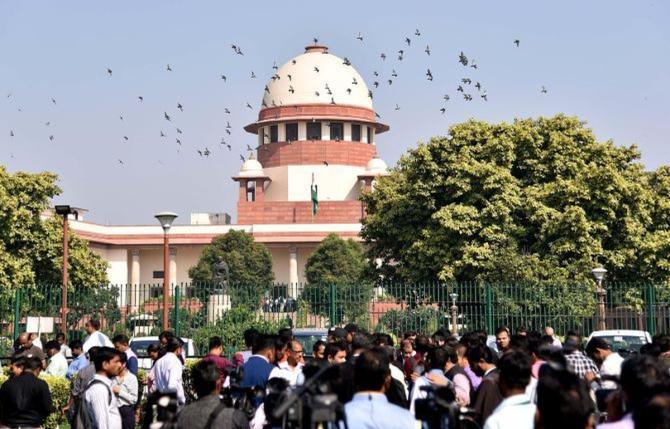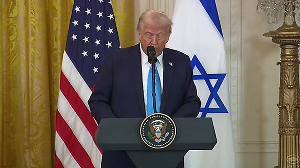In a landmark verdict just months ahead of the Lok Sabha polls, the Supreme Court on Thursday scrapped the Centre's electoral bonds scheme of anonymous political funding, calling it 'unconstitutional' and ordering disclosure of the bond's donors, amount and recipients by March 13.

Holding that the 2018 scheme was 'violative' of the constitutional right to freedom of speech and expression and right to information, a five-judge Constitution bench headed by Chief Justice D Y Chandrachud also rejected the Centre's contention that it was meant to bring about transparency and curb black money in political funding.
The verdict was seen as a blow to the Modi government.
Ordering closure of the controversial scheme forthwith, the top court also directed the State Bank of India(SBI), the authorised financial institution under the scheme, to submit by March 6 the details of electoral bonds purchased since April 12, 2019 till date to the Election Commission of India(ECI), which will publish the information on its official website by March 13.
It ordered that uncashed electoral bonds, which are within the validity period of 15 days, shall be returned by the political party or the purchaser to the issuing bank which in turn shall refund the amount to the purchaser's account.
"At a primary level, political contributions give a 'seat at the table' to the contributor. That is, it enhances access to legislators. This access also translates into influence over policy-making," said the bench also comprising Justices Sanjiv Khanna, B R Gavai, J B Pardiwala and Manoj Misra.
"An economically affluent person has a higher ability to make financial contributions to political parties, and there is a legitimate possibility that financial contribution to a political party would lead to quid pro quo arrangements because of the close nexus between money and politics," the top court said delivering its two separate but unanimous verdicts cumulatively spanning 232 pages.
"Transparency and not secrecy is the cure and antidote," said Justice Sanjiv Khanna in his separate and concurring verdict.
The top court also accorded primacy to the right to know of voters over the privacy claims of donors, saying it is 'paramount' for free and fair election and democracy.
The judgment referred to the annual audit reports of political parties from 2017-18 to 2022-23 which showed party-wise donations received through electoral bonds. Of the Rs 12,000 crore, the BJP received Rs 6,566.11 crore during this period, while the Congress got Rs 1,123.3 crore, according to the reports.
The Trinamool Congress received in its kitty Rs 1,092.98 crore in the same period.
The judgment was pronounced on a batch of petitions including those filed by Congress leader Jaya Thakur, the Communist Party of India (Marxist) and the NGO Association for Democratic Reforms (ADR) challenging the bond scheme.
Democracy does not begin and end with elections and the integrity of election process is pivotal for sustaining the democratic form of government, it said.
Holding that the electoral bonds scheme was not fool-proof, the court said information about funds received by a political party is essential for voters to exercise their freedom to vote effectively.
Leaders of several opposition parties hailed the verdict, terming it as an important step in ensuring transparency in electoral funding.
The Congress said it will reinforce the power of votes over notes, with party president Mallikarjun Kharge hoping the Modi government will stop resorting to such 'mischievous ideas' in future.
The BJP, however, sought to downplay the verdict, saying every decision of the apex court should be respected and accused the opposition parties of politicising the issue as they do not have any alternative to Prime Minister Narendra Modi's leadership.
BJP leader and former law minister Ravi Shankar Prasad said the annulled scheme had a laudable objective of bringing transparency in poll funding. He, however, added that his party respects the verdict.
Former Chief Election Commissioner S Y Quraishi said the verdict is a 'great boon for democracy'.
'Electoral Bonds declared unconstitutional by the Supreme Court. Three cheers for the SC!' he said in a post on X.
Jaya Thakur said the judgment will bring in transparency in political funding and protect the interest of people,
Advocate Varun Thakur, who represented Jaya in the case, described the ruling as a historical step for democracy.
"This is a major setback for the government because the SC has directed to disclose all transactions between 2019-24," Varun said.
The court directed the SBI to share details, including the 'date of purchase of each electoral bond, the name of the purchaser of the bond and the denomination of the electoral bond purchased'.
"SBI shall submit the details of political parties which have received contributions through electoral bonds since the interim order of this court dated April 12, 2019 till date to the ECI. SBI must disclose details of each electoral bond encashed by political parties which shall include the date of encashment and the denomination of the electoral bond."
Under the electoral bonds scheme, ruling parties can coerce people and entities to contribute, the top court said, and rejected as 'erroneous' the Centre's argument that it protects confidentiality of the contributor which is akin to the system of secret ballot.
"The electoral bond scheme and the impugned provisions to the extent that they infringe upon the right to information of the voter by anonymising contributions through electoral bonds are violative of Article 19(1)(a) (freedom of speech and expression) of the Constitution."
The CJI, who authored a 152-page judgement for himself and on behalf of Justices Gavai, Pardiwala and Misra, said, "The electoral bond scheme, the proviso to section 29C(1) of the Representation of the People Act 1951 (as amended by section 137 of Finance Act 2017), section 182(3) of the Companies Act (as amended by section 154 of the Finance Act 2017), and section 13A(b) (as amended by section 11 of Finance Act 2017) are violative of Article 19(1)(a) and unconstitutional."
The scheme, notified on January 2, 2018, was pitched as an alternative to cash donations made to political parties as part of efforts to bring transparency in political funding and tackling black money.
"The electoral bond scheme is not the only means for curbing black money in electoral finance. There are other alternatives which substantially fulfil the purpose and impact the right to information minimally when compared to the impact of electoral bonds on the right to information," the CJI said.
The bench said integrity of the election process is pivotal for sustaining the democratic form of government and the Constitution also places the conduct of free and fair elections on a high pedestal.
It said financial contributions to political parties are usually made for two reasons -- they may constitute an expression of support to the political party or the contribution may be based on a 'quid pro quo'.
'The huge political contributions made by corporations and companies should not be allowed to conceal the reason for financial contributions made by another section of the population: a student, a daily wage worker, an artist, or a teacher. When the law permits political contributions and such contributions could be made as an expression of political support which would indicate the political affiliation of a person, it is the duty of the Constitution to protect them,' it added.
It said not all political contributions are made with the intent of attempting to alter public policy and contributions are also made to political parties which are not substantially represented in legislatures.
The bench also noted it is true that contributions made as quid pro quo transactions are not an expression of political support.











 © 2025
© 2025